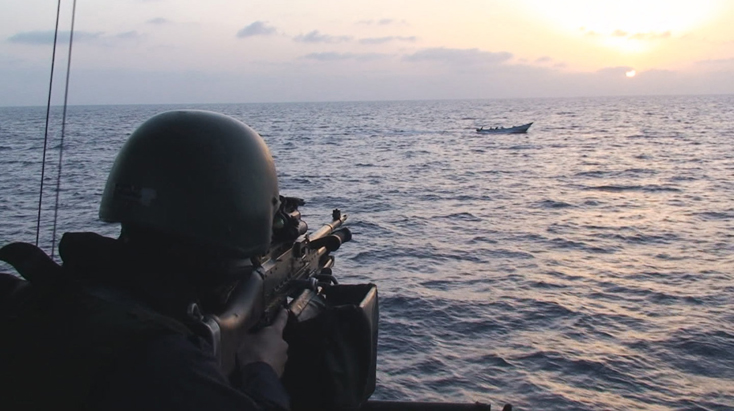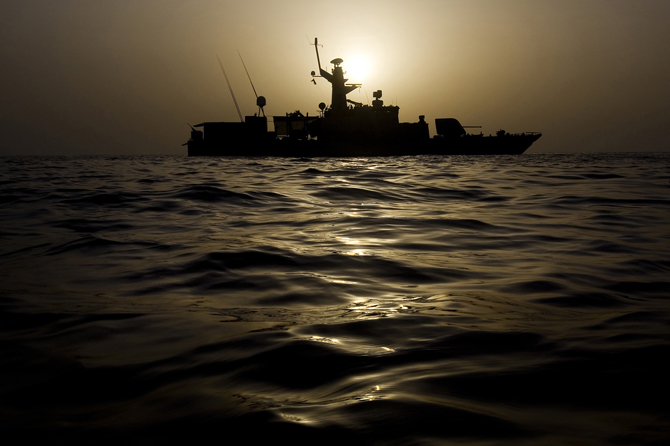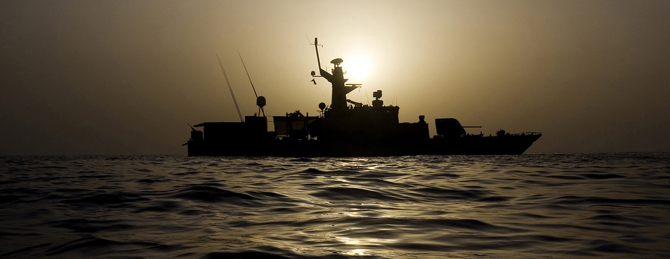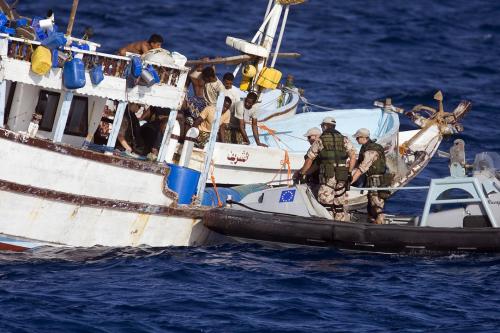Pirate captures land Swedes in murky waters.
Members of the Royal Swedish Navy have scored spectacular success in thwarting pirate attacks off Somalia. What happens when they capture the pirates, however, is less cut and dried.
-
 HMS Malmö advancing towards a suspected pirate skiff in the Gulf of Aden earlier this summer. Everyone aboard is on high alert. ADENVIKEN 20090526. Photo is a still from videorecording by Sergeant Mats Nyström/Combat Camera
HMS Malmö advancing towards a suspected pirate skiff in the Gulf of Aden earlier this summer. Everyone aboard is on high alert. ADENVIKEN 20090526. Photo is a still from videorecording by Sergeant Mats Nyström/Combat Camera -
-
By Chipp Reid
-
 HMS Stockholm in the Gulf of Aden earlier this summer. Adenviken 20090611. Photo: Johan Lundahl/Försvarsmakten/CombatCamera
HMS Stockholm in the Gulf of Aden earlier this summer. Adenviken 20090611. Photo: Johan Lundahl/Försvarsmakten/CombatCamera -
-
By their own admission, the hardest task facing the officers of the Royal Swedish Navy serving with the European Union Naval Force isn’t finding Somali pirates or preventing their attacks, it’s what to do with the pirates when they capture them.
Sweden currently holds command of Operation Atalanta, the EU-led mission off the Horn of Africa (http://www.nordstjernan.com/news/nordic/2142/). The primary task of the EUNAVFOR is to deter pirate attacks on United Nations World Food Program vessels carrying supplies to the impoverished Somali capital of Mogadishu as well as protect ships carrying supplies to an African Union peacekeeping force operating in the Darfur region.
The EU force has been wildly successful in not only thwarting pirate attacks but in capturing dozens of Somali buccaneers. The U.N. mandate under which commanders of the EU task force operate allows them to, “Arrest, detain and transfer persons who are suspected of, or who have committed, acts of piracy or armed robbery in the areas where they are present.” -
 HMS Stockholm in the Gulf of Aden earlier this summer. Adenviken 20090611. Photo: Johan Lundahl/Försvarsmakten/CombatCamera
HMS Stockholm in the Gulf of Aden earlier this summer. Adenviken 20090611. Photo: Johan Lundahl/Försvarsmakten/CombatCamera -
Captured, then what..?
That’s the easy part. What happens once an alleged pirate is in custody, however, is where the legal waters grow murky. The European Union commanders have no civilian legal jurisdiction to try suspected pirates. The U.N. mandate also has no instructions about how to deal legally with suspected pirates.
The EU signed an agreement in March, 2009, with Kenya, allowing courts in that African nation to prosecute pirate suspects. When a pair of Swedish corvettes under Commander Magnus Jonsson captured two boatloads of pirates last year, the Swedes duly turned them over to Kenyan authorities. They have yet to stand trial. Critics say this only reinforces doubts that Kenya — which is still recovering from postelection turmoil in 2007 that left more than 1,000 people dead — can handle the costly and complicated task of trying all or even most cases that emerge from the exploding piracy crisis in the Indian Ocean.
Apparently, several EU member states agree. France, Portugal and the Netherlands prefer to send pirate suspects to their own countries to stand trial. Spain and Belgium have an agreement with the government of the Seychelles – an island nation in the Indian Ocean – to prosecute suspects, which is yet another legal quagmire. Jonsson, who led a three-ship Swedish task force off Somalia last year, said it is often difficult to tell pirates from fishermen, attack made doubly difficult by EUNAVFOR regulations.
“We operate under some very strict rules of engagement,” said Commander Magnus Jonsson of the corvette HMS Stockholm. Jonsson served with the EUNAVFOR in 2009, leading a force of three Swedish warships to the Gulf of Aden.
“We’re not allowed to board suspected pirate vessels until we are able to determine if they are carrying pirate equipment such as ladders, extra fuel and grappling hooks. Fishermen don’t need those things,” Jonsson said. -
 A Swedish Vessel Protection Detachment (VPD) inspects a fishing boat off the coast of Somalia. Photo by Sergeant Johan Lundahl/Försvarets Bildbyrå
A Swedish Vessel Protection Detachment (VPD) inspects a fishing boat off the coast of Somalia. Photo by Sergeant Johan Lundahl/Försvarets Bildbyrå -
'Pirates of opportunity'
One of the problems the Swedes ran into was many fishermen are pirates of opportunity. They leave port as legitimate fishermen, but if a stray merchantman comes their way, they can quickly morph into pirates. Jonsson also said many fishermen carry firearms to protect themselves from pirates or human smugglers, who also operate off the Somali coast.
“It’s very hard to see the difference,” Jonsson said. “The boats look the same. The only difference is fishermen carry nets and smugglers and pirates carry hooks and ladders.”
Yet another thorny legal issue facing Admiral Jan Thornqvist, the new commander of the EU task force, is the increasing presence of armed security forces on board merchant vessels.
Officially the EUNAVFOR disapproves of private security on merchant vessels. There is, however, little it can do about it. More and more shipping companies have turned to private security as pirate attacks have escalated off the coast of Somalia. The legal problem these private military operators create is one of jurisdiction.
According to international treaties, private security guards must abide by the national laws of the flag the vessel on which they serve flies. However, many of the biggest shipping companies in the world, including those in the United States, England and Japan, “flag” or register, their vessels in nations such as Liberia, Panama, or the Isle of Man. This practice creates the possibility of both countries claiming jurisdiction over suspected pirates. -
Third and fourth country crews
Just to add to the legal confusion, the crew and hired guns are often from yet another country. That same Panamanian-flagged, German-owned ship could have a crew from the Philippines and Ukraine while its security force could be former South African marines or U.S. Navy SEALs, creating the chance a third country could enter the legal fray and at least claim jurisdiction over its own people.
Admiral Thörnqvist, who officially took command of the task force April 14, said EUNAVFOR is aware of problems private security could pose in the region, and not just from a legal standpoint.
“We are looking into that carefully,” he said. “There is always a risk if you arm yourself. It could escalate what the pirates are prepared to do. They could bring in other kinds of weapons and it could also risk hostile acts against ships already hijacked. We are well aware what is happening and at the moment is not something the EU NAVFOR is recommending.”
While armed security on board merchant vessels can complicate the task of the EUNAVFOR, Thörnqvist said it would have no effect on how his task force executes its mission.
“I am honored to have this job and I will do my very best to keep waters of Somalia safe,” he said. “It is a huge area and we will do our best.” -
In related news, the Swedish King Carl XVI Gustaf visited the troops at the Gulf of Aden http://www.nordstjernan.com/news/nordic/2228/
-
-
